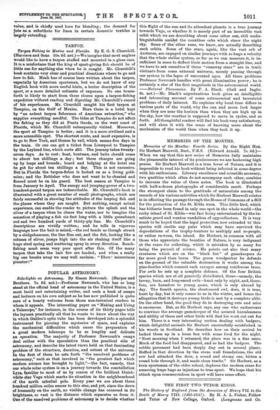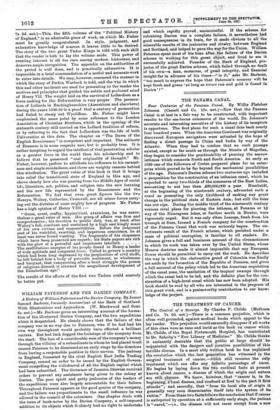THE FIRST TWO TUDOR ICINGS. The History of England from
the Accession of Henry VII. to She Death of Henry VIII. (1485-1547). By H. A. L. Fisher, Fellew and Tutor of New College, Oxford. (Longmans and Co. 75. 6d. net.)—This, the fifth volume of the "Political History of England,".is. an admirable piece of work, on ,which Mr. Fisher must be greatly congratulated. In style, judgment, and exhaustive knowledge of sources it leaves little to be desired. The story of the two great Tudor Kings is told with such skill that the reader is loth to lay the volume aside. This power of , creating interest is all too rare among modern historians, and deserves ample recognition. The appendix on the authorities of the period is well done, and is practically exhaustive. It is impossible in a brief commendation of a useful and accurate work to enter into details. We may, however, commend the manner in which the story of Perkin Warbeck is told, and the way in which this and other incidents are used for presenting to the reader the motives and principles that guided the subtle and profound mind of Henry VII. The weight laid on the survival of Lollardism as a force making for the Reformation is very proper. The persecu- tion of Lollards in Buckinghamshire (Amersham and elsewhere) during the years 1506-10 is a proof that a century of persecution had failed to stamp out Wycliffism. Mr. Fisher might have emphasised the same point by some reference to the London Association of Christian Brothers, which in the opening of the sixteenth century still carried on the Lollard tradition of reform, or by referring to the fact that Lollardism was the life of both Universities at this date. The chapter on "The Dawn of the English Renaissance" is competent and important. The estimate of Erasmus is in some respects new, but is probably true. It is rather tempting to regard the intellect of that penetrating scholar as a greater force in the world than his scholarship and to believe that he possessed "real originality of thought." Mr. Fisher, however, prefers to attribute his influence to his earnest- ness and single-mindedness, and there are weighty reasons behind this attribution: The great value of this book is that it brings into relief the transitional state of England in this age, and shows clearly how she was passing from the Middle Ages of social life, literature, art, politics, and religion into the new learning and the new life represented by the Renaissance and the Reformation. We feel that even great figures like the two Henrys, Wolsey, Catherine, Cromwell, are all minor forces carry- ing out the dictates of some mighty law of progress. Mr. Fisher has a high opinion of Henry VIII. :— "Gross. cruel, crafty, hypocritical, avaricious, he was never- theless a great ruler of men. Ilia grasp of affairs was firm and comprehensive ; his devotion to public duty was, at least after Wolsey's fall, constant and sustained by a high and kingly sense of his own virtues and responsibilities. Before the judgment seat of his watchful, exacting, and imperious conscience, he at least was never found wanting. The fragments of his eloquence which have been preserved are superb ; his State papers are rich with the glow of a powerful and impetuous intellect. . . . . . The multifarious energies of his people found in Henry a leader of wide aptitude and congenial force. Called to govern a country which had been long depressed by the perplexities of civil strife, he left behind him a body of patriotic sentiment, so wholesome and buoyant, that vanquishing after a brief struggle the poison of religious discord, it attained the magnificent development of the Elizabethan age."
The results of the efforts of the first two Tudors could scarcely be better put.

















































 Previous page
Previous page